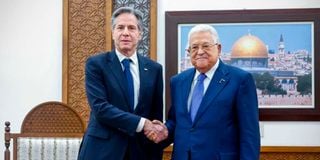Premium
Antony Blinken meets Palestinian leader Mahmud Abbas as Israel keeps bombing Gaza

US Secretary of State Antony Blinken (left) meets with Palestinian president Mahmud Abbas, during his week-long trip aimed at calming tensions across the Middle East, in the Muqata'a, in Ramallah in the Israeli-occupied West Bank on January 10, 2024.
The Israeli army kept bombing the Gaza Strip and fighting Hamas militants on Wednesday as US top diplomat Antony Blinken met the head of the Palestinian Authority in the occupied West Bank.
The military said it killed dozens of "terrorists" and hit another 150 targets in Hamas-run Gaza, where the health ministry said 147 people had been killed over the previous 24 hours.
The bloodiest ever Gaza war started by the October 7 Hamas attack has raged on for more than three months and killed over 23,000 people in the besieged Palestinian territory, according to its health ministry.
Palestinian President Mahmud Abbas spoke with Blinken of the need "to stop the Israeli aggression against Palestinian people in the Gaza Strip and the West Bank", which has also been torn by deadly unrest, said the official Palestinian news agency Wafa.
Blinken told Abbas that Washington supports "tangible steps" towards the creation of a Palestinian state -- a long-term goal which the hard-right Israeli government of Prime Minister Benjamin Netanyahu has opposed.
The secretary of state reiterated the US position that a Palestinian state must stand alongside Israel, "with both living in peace and security", said State Department spokesman Matthew Miller.
As Blinken arrived under tight security at Abbas's headquarters in Ramallah, a group of protesters held up signs that read "Stop the genocide", "Free Palestine" and "Blinken out". Some scuffled with Palestinian security forces in riot gear.
Abbas was later set to discuss a "push for an immediate ceasefire" in Gaza in talks with Jordan's King Abdullah II and Egyptian President Abdel Fattah al-Sisi in the Red Sea port city of Aqaba.
Blinken was next headed to the Gulf state of Bahrain, home base of the US Fifth Fleet, for talks with King Hamad on preventing a regional escalation of the war, the State Department said.
Since the Gaza war started, fears have grown of a widening conflict between Israel and Iran-backed armed groups, especially Lebanon's Hezbollah but also groups in Syria, Iraq and Yemen.
Yemen's Iran-backed Huthi rebels have carried out numerous attacks on passing merchant ships in the Red Sea, and the United States has set up a multinational naval task force to protect the vital sea lane.
On Tuesday, the rebels "launched a complex" attack, US Central Command said, adding that US and British forces had shot down 18 drones and three missiles, with no casualties or damage reported.
'Sacrificed our children'
The war started when Hamas launched its unprecedented October 7 attack, which resulted in about 1,140 deaths in Israel, mostly civilians, according to an AFP tally based on official figures.
Militants also took around 250 hostages, of whom Israel says 132 remain in Gaza including at least 25 believed to have been killed.
Israel has responded with a relentless military campaign that has killed at least 23,357 people, mostly women and children, according to the Gaza health ministry.
The Israeli army says 186 of its soldiers have been killed inside Gaza in its campaign to destroy Hamas.
The United Nations estimates 1.9 million Gazans have been displaced inside the territory that had already endured years of blockade and poverty before the war.
Global concern has flared over Gaza's humanitarian crisis, and Blinken -- while voicing continued US support for top regional ally Israel -- has urged steps to reduce the suffering.
Dire shortages brought by an Israeli siege mean the "daily toll on civilians in Gaza, particularly children, is far too high," Blinken said on Tuesday after his talks with Netanyahu.
Blinken called for "more food, more water, more medicine" for Gaza, where only limited relief supplies have been arriving from Egypt.
Desperate Gazans on Tuesday climbed onto one truck carrying flour and canned goods and tossed the food to the crowd below, AFP footage showed.
Army spokesman Daniel Hagari said Israel is "ready and willing to facilitate as much humanitarian aid as the world will give".
The war raged on unabated and the army reported more deadly fighting in Gaza's central Maghazi and southern Khan Yunis areas.
Troops had found 15 tunnel shafts as well as rocket launchers, missiles, drones and explosives in Al-Maghazi and destroyed machinery for making rockets that have been fired at Israel, the army said.
One of the many displaced Palestinians, Hassan Kaskin 55, told AFP: "We have lost our money, our houses, our jobs. We are losing our youths as well.
"We've sacrificed our children for our homeland."
US crisis diplomacy
Blinken is on his fourth tour of the Middle East since the outbreak of the war, and was later headed to Egypt, after earlier stops in Turkey, Saudi Arabia and the United Arab Emirates.
Washington has floated a post-war scenario in which a reformed Palestinian Authority governs Gaza as well as towns and cities in the West Bank, which Israel has occupied since 1967.
A post-war plan outlined by Defence Minister Yoav Gallant envisions local "civil committees" governing Gaza after Israel has dismantled Hamas.
Hamas, an Islamist movement, seized sole control of the Gaza Strip in 2007, ousting Abbas's Fatah party, with which it had shared power after sweeping parliamentary elections.
The United States and European Union have blacklisted Hamas as a "terrorist" organisation.
Hamas's Qatar-based chief Ismail Haniyeh said last week he was "open to the idea" of a single Palestinian administration in Gaza and the West Bank.





